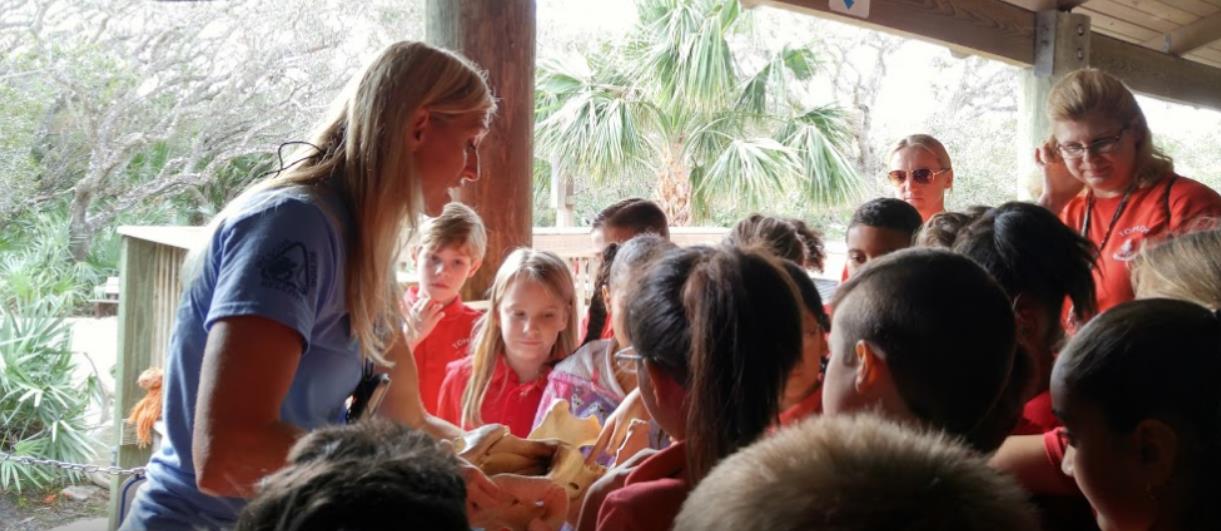FIELD TRIPS
Plan a field trip to the MSC and provivde your students with a unique opportunity to learn about and protect their environment.
Our Mission
To provide an innovative learning experience where visitors can discover, enjoy and appreciate the many wonders that embody the world of marine science in Volusia County.
Our Programs
Our school field trips offer five programs that can accommodate students in grades K-12 and are coordinated with Next Generation Standards. Field trips are not offered June 1st through August 14th when Summer Camp is in session. Our school field trip programs are listed below.
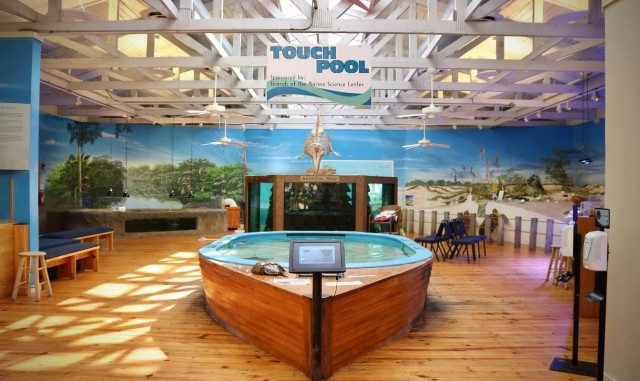 Marine Science Center Exhibit Tour
Marine Science Center Exhibit Tour
Students and Groups will be guided on a tour of the Marine Science Center (MSC) focusing on Volusia County's ecosystems and MSC’s rehabilitation efforts. Your field trip will be led by educators to explore and learn about the reptiles in the classroom. You will also journey through the Florida ecosystems in the gallery and have an interactive hands on experience at the touch tank. You will then venture onto the turtle terrace and get an insight into how we rescue, rehabilitate, and release the sick and injured sea turtles who come into our hospital. Finally, you will meet the raptors and walk through our bird sanctuary to learn the many fascinating facts about birds of prey. You can have gift shop time, if your group picks that option, to take home a keepsake and memory of your visit.
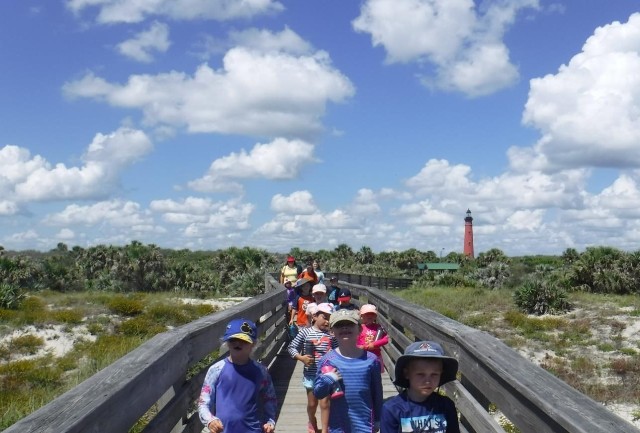 Marine Science Center Exhibit Tour plus Eco Walk
Marine Science Center Exhibit Tour plus Eco Walk
Your students or group will enjoy the Exhibit Tour outlined above. Then your group can choose to have lunch (not provided) on our side deck, in the amphitheater, or in the park next to the lighthouse (size of group and weather are determining factors for location). If your school has a parking fee waiver for Lighthouse Point Park (LPP) or chooses to pay to go into the park for their eco walk then your group can have lunch at the pavilion overlooking the inlet. After lunch our educator’s will meet your group and take them on an interpretive journey to explore the Coastal Hammock, Dune, and Beach Ecosystems, walking over raised wooden boardwalks for amazing views in hopes of spying some native animals and plants. Groups in LPP will experience the Jetty.
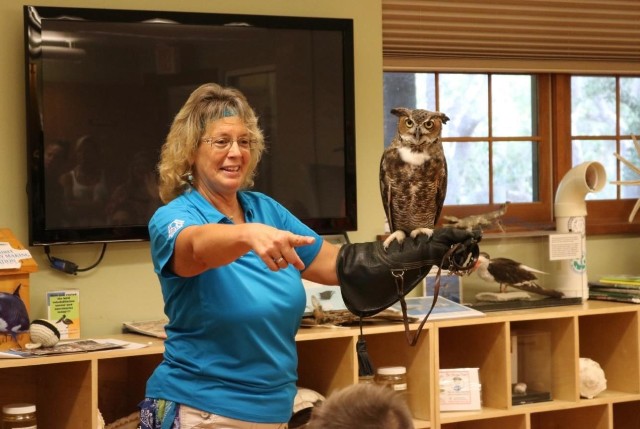 Raptors Live
Raptors Live
This interpretive program offers inspiring ways to learn about birds of prey and the MSC Rehabilitation Hospital. A live Raptor presentation will be given to your group showcasing one of the MSC’s live non releasable raptors. With this up-close and personal experience, the group will learn about the birds’ unique attributes and ways they have adapted to hunting prey and surviving in their natural habitats. Students will also learn about habit loss and other environmental issues affecting birds. Afterwards, your group will complete a hands-on owl pellet dissection lab on the side deck. Students will see if they have all the bones to re-construct a complete skeleton of the owls prey. Then students will explore the MSC gallery, stingray touch tank, and sea turtle rehabilitation hospital from the viewing platform and visit the gift shop (optional).
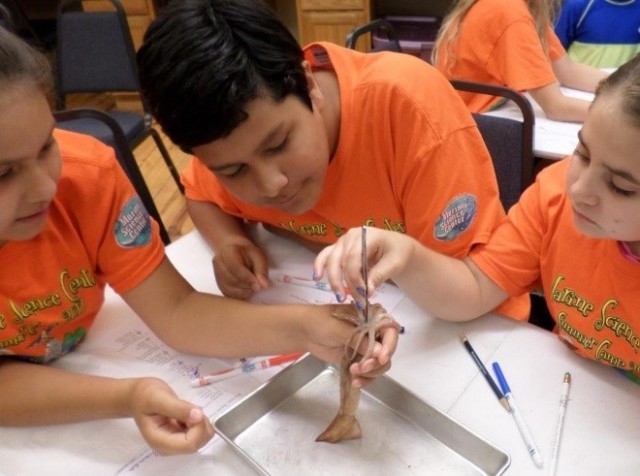 Marine Cephalopod Encounter/Squid Dissection
Marine Cephalopod Encounter/Squid Dissection
Squid dissection allows students to examine structural adaptations and observe the relationship between form and function. Squid are complex, intelligent invertebrates that allow comparison to higher and lower-level animals. Students will work in pairs to dissect a freshly thawed squid while investigating the squid's external and internal anatomy, exploring the many adaptations needed for survival in the marine environment. Students are introduced to laboratory skills and even get to write with the squid's pen and ink! Students will then explore the MSC gallery, Octopus Exhibit (dependent on animal availability), and the Stingray Touch Tank. They will then view and learn about our sea turtle rehabilitation hospital on the turtle terrace and an optional visit to the gift shop.
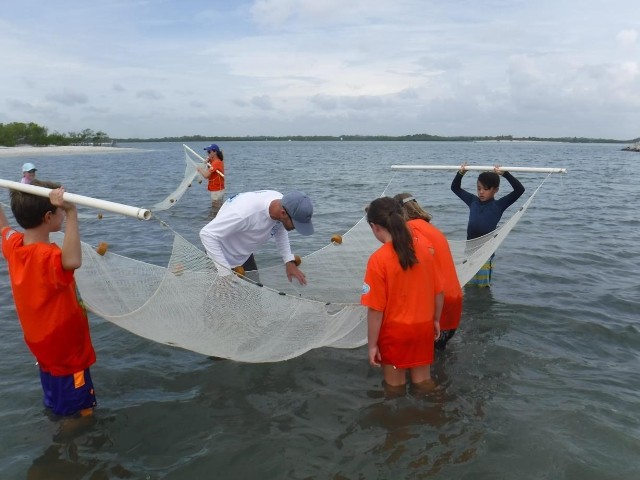 Estuary Program (Including Seine Netting)
Estuary Program (Including Seine Netting)
With outdoor hands-on and in water activities in the estuary, students will study and learn about the fish, animals, and plants that live in this habitat. They will gain an understanding of their important role in our environment. Your students will practice the ancient art of seine netting, a technique used by the Native American Indians, and pull seine nets to collect and study the inhabitants of this brackish water system.
Students will learn the definition of an ecosystem, including the abiotic and biotic components and processes. They will understand that ecosystems have no specific scale and can change when biotic or abiotic components, or processes within the ecosystem change. They will even discover the wonders of things they can’t see, microscopic plankton exploration, and may also conduct some water quality tests to help assess the health of the water they are immersed in. Students are welcome to explore the MSC after the outdoor program and visit the gift shop, time permitting.
Field Trip questions can be addressed to Shell Webster: MSCEDU@volusia.org.
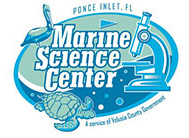
 DONATIONS
DONATIONS
